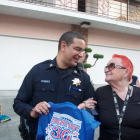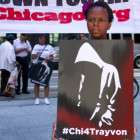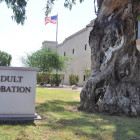
OP-ED: We Are All Anarchists at Heart
|
The changes that last will come when people start to take responsibility for themselves and their communities. They’ll happen when we find other ways to address our conflicts besides calling the police.
Juvenile Justice Information Exchange (https://jjie.org/author/john-lash/page/8/)

The changes that last will come when people start to take responsibility for themselves and their communities. They’ll happen when we find other ways to address our conflicts besides calling the police.

In theory, National Night Out sounds a little strange -- encourage thousands of residents, in cities nationwide to throw block parties and barbecues that will be attended by city law enforcement. In practice, National Night Out is a city-sanctioned, nationwide, one-night event to encourage residents to get to know their neighbors and reclaim their streets, all in an effort to deter crime. In urban hubs across the country, this message resonates particularly strongly, where some communities have historically had complex and sometimes strained relationships with the police.

Can we have an open, honest discussion about race? I’m not making a request to have such a conversation, what I am wondering is if it is possible.

The suburban street where I have lived the past two years has about 45 houses, not counting cross streets and cul-de-sacs. I imagine that there are about 250 folks in these houses. I see families driving down the street and couples walking their dogs. I think I have met about 12 of them. That’s not many out of 250.

Following mass demonstrations in cities nationwide, thousands took to the streets of Chicago over the weekend to protest.

Community supervision aimed at high-risk offenders, as well as mandatory evidence-based programs, have the potential to curtail the U.S. correctional system.

I used to think that violence could solve almost any problem. That kind of thinking lead me down a very dark path, one that dumped me in prison at age 18.

Texas legislators are once again taking up the debate on what to do with 17-year-olds convicted of murder. The issue was set to be debated a few weeks ago, right after the Senate addressed limiting abortion rights, but Wendy Davis’ 13-hour filibuster of the anti-abortion bill ran out the clock on the regular session. Gov. Rick Perry quickly scheduled a special session, however, and on Thursday the fate of these kids will be back in the hands of the Republicans. The outcome will not be good. Kids who are 17 have fallen into a strange gap in Texas law.

As I write this the nation is celebrating the 237th anniversary of the ratification of the Declaration of Independence. It’s pretty rainy here in Athens, but we will drag the grill under the porch and cook some hot dogs (actually chorizo) and hamburgers later today. Flags are everywhere, on my Facebook feed and on the streets, and there are the usual references to patriotism, freedom, and plenty of pictures of eagles. Maybe it’s the dreary weather, but I find my thoughts turning to the less savory parts of the nations past, and to the ways in which they continue to play out today. One of history’s ironies is that the nation most associated with liberty permitted slavery, and that many of the founding fathers were slave owners.

The nation loves an entrepreneur, or at least a good story about one. There is something about the “pull yourself up by your bootstraps” mentality, the lure of taking big risks for big rewards, and the dream of working for ourselves that is attractive, especially in a world where most of us find ourselves working for someone else in a less than ideal setting, and doing work that isn’t particularly rewarding either financially or personally. One subset of the entrepreneurial storyline involves crime, especially drug dealing. This is even more appealing to those who lack the connections, education, money and other kinds of support that make more mainstream ventures possible. For kids growing up in a lot of neighborhoods in this country the drug dealer may be the only example of someone working their way to a better life they see.